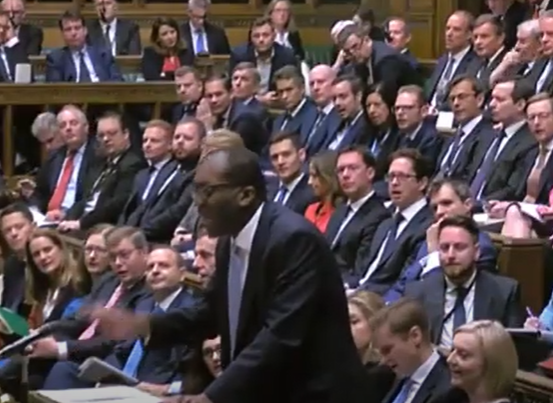
CONSERVATIVE MPs cheered as the Chancellor confirmed that the cap on bankers' bonuses will be removed during an announcement in the House of Commons.
In a so-called mini-budget which saw him cut taxes for high earners and add restrictions to the welfare system, Kwasi Kwarteng argued that tax cuts are “central to solving the riddle of growth”.
The decision to axe the cap on bankers’ bonuses has been met with backlash amid fears it will see the return of a “culture of greed” in the City as the public suffers from a deepening cost-of-living crisis.
The controversial move will remove the limit on bankers’ annual pay-outs – which has been capped at 100% of their salary, or double with shareholder approval – introduced by the European Union after the 2008 financial crisis.
Kwarteng said the move would encourage global banks to create jobs, invest, and pay taxes in the City.
Pay in bonuses aligns the incentives of individuals with those of the bank, therefore supporting growth of the UK economy, the Government added.
“All the bonus cap did was to push up the basic salaries of bankers, or drive activity outside Europe,” the Chancellor told the House of Commons when he unveiled the Treasury’s mini-budget on Friday.
Michael Barnett, a partner at Quillon Law and who led litigation involving high-profile banking scandals following the 2008 crisis, warned that the decision risks re-introducing a culture of greed that preceded the financial crash.
He said: “To many who were scarred by the consequences of the 2008 global financial crisis and the banking scandals that accompanied it, news that caps on bankers’ bonuses may be abolished will trigger a response bordering on visceral.
“Bankers’ bonuses were seen as emblematic of an imploding financial services industry that was fuelled by a culture based on greed and pursuit of profit at any cost.
“Bonuses and other financial incentives formed a major component of many claims that were brought in the courts, whether successful or otherwise.”
Overall, the Government’s mini-budget is estimated to contain total tax cuts of £45 billion by 2026/27, according to figures published by the Treasury.
Government estimates also indicate that tax cuts in 2023/24 will be worth nearly £27 billion.
Shadow chancellor Rachel Reeves said: “The Chancellor has made clear who his priorities are today – not a plan for growth, a plan to reward the already wealthy. A return to the trickle-down of the past, back to the future, not a brave new era.”
Meanwhile, the SNP's shadow chancellor Alison Thewliss described the policies announced as a "reverse Robin Hood".
"Taking billions of pounds away from ordinary families, small businesses and our NHS, and handing it over to the richest people and biggest businesses in the UK," she explained.
"After a decade of Tory cuts and Brexit damage, the UK already had the worst poverty and inequality in north west Europe - before energy bills began to rise. Now millions of families will be pushed further into hardship and saddled with billions in public debt.
"The UK Government must urgently come back with an emergency budget to fix the mess it has created. Instead of boosting bankers' bonuses, it must target resources at low and middle income families and small businesses, including by cutting energy bills, introducing a Real Living Wage, reversing Tory cuts to Universal Credit and lifting the benefits cap."







